Mountain View's Google Stadia and its ambition to dominate the game industry
'The future of the gaming industry is not in an iron box with dozens of complex components, which will depend on server systems and extensive internet connections', that is a judgment from Google. in the launch of Stadia - a completely new gaming platform that allows gaming through its cloud service. Like the way people build great structures, both as a symbol of intellectual climax, and can be used for hundreds of years, Google believes that they build on the Stadia platform will plays a huge role in shaping the future of the gaming industry. It is understandable that Stadia will fundamentally change the method of playing video games as well as playing live video (livestream) today, from individualized forms to centralized areas as well as servers through connection. Internet. That means that for Stadia, users only need a Chrome browser and a high-speed, stable Internet to be able to smooth out most of today's massive titles, and can also stream all content directly. What I want on most internet-connected devices today like smart TVs, smart phones, tablets, or laptops . This is really a strategic card with a huge ambition that is changing Google's game industry, but can this platform bring great success like the expected Mountain View giant?
In addition to the great features already known, there are still many things that make people wonder about Stadia, especially in the future of the platform.
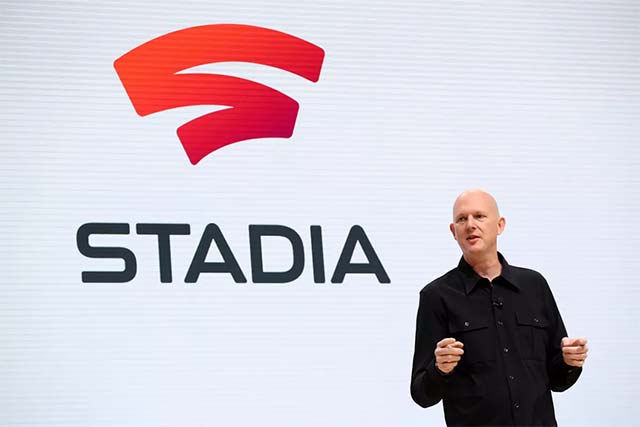
- Experience Google Stadia: Great overall, but there are still many unknowns
Google Stadia
- Chrome and Youtube - a 'tonic dose' for the strong development of Stadia
- Supported games, Linux, and service prices
- Internet connection - a factor that plays a decisive role
- Gaming experience and image processing quality
- The fight is full of hardship
Chrome and Youtube - 'tonic dose' for the strong development of Stadia
It can be seen that Stadia's central feature is playing games via Chrome and streaming on YouTube, all based on the cloud platform. In other words, Google is trying to take advantage of YouTube to rely heavily on the popularity of popular clips and accounts (with many followers) on the platform, who are often livestreaming games to millions. people on online video streaming services. In fact, Fortnite communities and games have turned into 'money-making' virtual locations that attract millions of people to play, chat and watch livestream videos. Fortnite alone earned about $ 2.4 billion last year, and one of the game's most famous streamer has also bagged more than $ 500,000 per month. The economic profit here is very large, and of course Google also recognizes this.
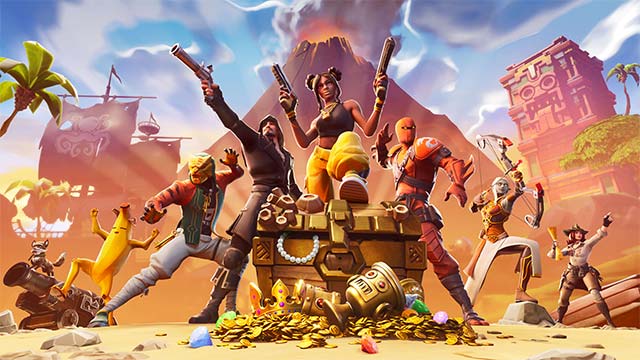
- This young man plays Fortnite and earns $ 500,000 a year
The advantage that Stadia brings is that you can watch clips or livestream videos of any game and then join play immediately or even access to the same point in the game on the clip you are watching with just one few simple operations. Streamer will be able to create lobby for fans to join the game with them right on YouTube, and Stadia will support instant roaming for this video sharing service. Thus, it can be understood that this is a game console system running on the cloud and developed specifically for YouTube - that is the advantage that Google is holding.
Chrome also plays a big role in supporting Stadia's development as the world's most commonly used browser platform. Stadia will only be available through Chrome, Chromecast and on original Android devices. Google has promised to develop more browser support platforms for Stadia in the future, but it is unclear what time it will be. In addition, during the introduction ceremony, Google only demonstrated this service on its own devices and did not mention support for iOS via a dedicated application or Apple Safari mobile browser, so Chrome is still the main platform for users to reach Stadia.
- Google Chrome on Android has just been updated, doubling the page loading speed, saving up to 90% data usage
Supported games, Linux, and service prices
Along with that, Google will face and overcome some significant obstacles if they want to become the dominant game industry in the future. The most prominent among them is the diversity and ability to support games on their platforms. During the launch, Google only showed that a new game, Doom Eternal, ran on Stadia and promised that there were more than 100 studio games that owned the dev tool set. In addition, the publisher introduced his own Stadia Games and Entertainment studio to develop exclusive titles exclusively for Stadia, but Google did not mention any details about the games they will grow in the future, causing many to be skeptical about the studio's true prospects.
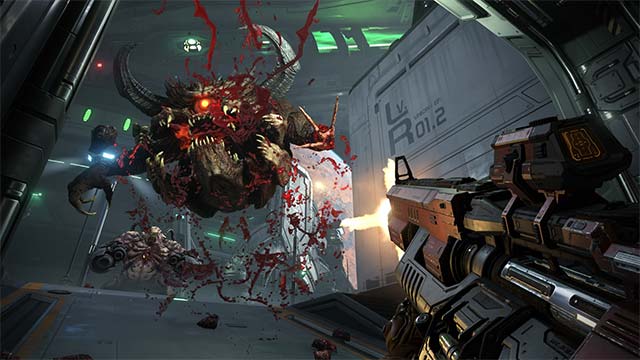
Another important information is that Google is using Linux as Stadia's server-side hardware operating system. That means game developers will need to transfer their games to Stadia and you won't have to buy the games you already own in some other cloud gaming services (Nvidia GeForce Now or Shadow). In addition, Google is partnering with Unreal, Unity and even middleware companies like Havok to develop the game library for Stadia, but there will also be some other necessary moves regarding the Developers must be launched to promote bringing the game to this platform. As such, Google needs to convince major publishers to join, but problems related to the cost of developing, publishing and running games on Stadia will also be a problem.
For the time being, Google has yet to announce pricing for hardware devices as well as integrated service packages in the Stadia ecosystem. Therefore, we still cannot know for a moment whether this platform will operate on a monthly subscription model, like Spotify or Netflix, or you'll have to pay for each game, similarly on platforms. Other digital platforms like Steam or Apple App Store. These are important questions that Google will need to answer to users in a clear and logical way this summer. It felt like Google was too rushed to introduce its blockbuster right in the framework of the GDC Game Developer Conference recently, making it impossible for them to have the best answers to many questions from the side. user.

- Apple Music is now available on Amazon Fire TV
Internet connection - a factor that plays a decisive role
On the other hand, Google also intended to avoid big questions around an important factor in its cloud-based gaming platform, which is internet connection. Google is using its own compression technology to stream games in 1080p or 4K to devices, and latency will often decrease when users own both the top client and game server. a machine. However, you will need a strong and stable internet connection to use Stadia in the smoothest way, and Google is recommending that users use a connection of about 25Mbps for 1080p resolution in quality. 60fps amount. In an interview with Kotaku, the head of the Google Stadia project, Phil Harrison, said the platform would be able to reach 4K but only increase the necessary bandwidth to about 30 Mbps. This means that if you live in areas with a high average fixed broadband connection (as in the US is about 96Mbps), the experience with Stadia will certainly be fine. However, in places where internet connection is unstable or simply slow, Stadia may not work as expected. In addition, when using this service, you should also pay attention to packages and data traffic, because if you play a lot of games, your data limit will soon exceed the allowable level. We do not know the exact bitrate of Stadia, but referring to some services on the market, it can be seen that a regular Netflix HD stream uses about 3GB per hour and this number doubles for 4K, Stadia streams. there probably won't be too many differences.

- NASA's Internet speed rumor reaches 91 Gb / s, is it true to download movies in 1 second?
However, high speed does not mean that the latency will decrease or disappear completely, this is a big problem for any game streaming service. Services like Netflix can download and buffer fixed content that you stream online, but a game service like Stadia depends on both the actions the user performs on the controller handle as well as real-time signal forwarding between the user and the server they are playing (the delay period can occur when you press the button and the corresponding task is displayed on the screen). This means that the closer you are to the server you are playing, the lower the latency will be.
Google is holding a big advantage, its huge cloud infrastructure, but in general, the problem still lies if you are not near a big city where Google data center is located, Most likely, you still can't get the most ideal experience with Stadia. Google is partly addressing this problem by directly connecting the Stadia controller handle to the server you are playing via WiFi, but it will be difficult to control thousands of ISPs, as well as how they route traffic to their data center.
Besides, another important thing you should keep in mind: Stadia is a completely cloud-based service, which means you will not be able to use this service offline. If you're in the habit of syncing some Netflix with your phone or tablet to watch when you go out because you know your LTE connection is bad, but with Stadia it's different, you'll have to maintain a connect seamlessly to Google's server to use this service. Until 5G is widely available, it seems that at the moment, using Stadia with a mobile internet connection is not possible.

It can be said that internet connection will be a key factor determining user experience with Stadia, which can be one of the big reasons that this service is difficult to reach many users if Google does not have it. solutions to overcome future problems.
- Post-MWC 2019: 5G has a long and tough road ahead
Gaming experience and image processing quality
According to a report from Google, every Stadia server will be integrated with a custom x86 processor running at 2.7GHz, 16GB of RAM, and especially not to mention the custom AMD GPU with processing power up to 10.7 teraflops (10.7 trillion calculations per second). Thus, we can see that Stadia is completely superior to the Xbox and PlayStation in the battle of processing power, when the Xbox One X reaches about 6.0 teraflop and the PS4 Pro is about 4.2 teraflop. This graphics power is very impressive but most do not decide too much about the final experience because as mentioned, the smoothness of the actual game will depend entirely on your internet connection.
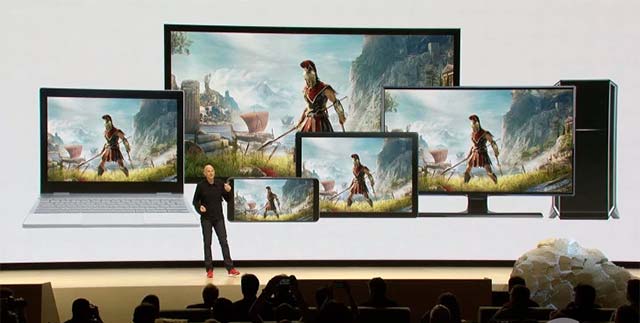
- Google Stadia uses custom AMD chips, powering up to 10.7 teraflops
Google will compress images from their server to your client, resulting in a slight loss of image quality. We do not know the exact bitrate that Google will use for Stadia, but if you have ever seen the 4K version of a Netflix program, you will find that the image quality on this platform is as good as Blu-copies. ray. The same thing applies to Stadia, and whether or not you have such a quality picture experience will depend on the internet connection and the device you use to access Stadia. Low resolution screens will reduce image quality quite significantly, and more internet bandwidth will give you higher bitrate and therefore, images will also be of higher quality.
Besides, the image quality will also be different between games, but Google did not show many different game variations in the premiere so we really understand that Stadia will work well. How in fact.
Experts from Eurogamer had the opportunity to test limited Stadia with Assassin's Creed Odyssey, showing that the game was handled smoothly, jerky, lag rarely occurred, while still Maintaining quality graphics and high frame rate. However, for first-person shooter games that require fast player response times or fast-moving action games, Stadia will likely encounter 'embarrassment' with possible late events. Out more often.
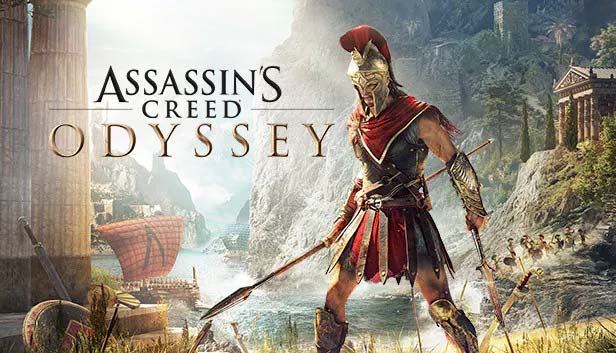
- A quick sense of Google Stadia game handle: Amazingly handy, amazing
All of this makes Stadia look like an early beta for a platform that is supposed to determine the future of the gaming industry. Google has spared no money from recruiting many of the tech industry's outstanding talents for this ambitious project, including Phil Harrison, the former director of Sony and Microsoft, and now the head. Stadia project, Jade Raymond, who previously worked at Sony, Electronic Arts and Ubisoft, is leading the game segment on Stadia. Besides, former Xbox Live Arcade creative director Greg Canessa is also working at Stadia, along with former Xbox game manager, Nate Ahearn. All these "gems" will be the core for Google to take advantage of the cloud-based gaming battle.
The fight is full of hardship
Prior to Stadia's appearance, another name in the gaming industry was Sony, which also provided streaming PlayStation games to game consoles and PCs through its PlayStation Now platform. Sony is really serious about this project, they bought the Gaikai online streaming service to turn it into a PlayStation Now, and even 'annexed' the OnLive rival just to eliminate the competition. . Another 'old village' name is Microsoft, which is planning to launch its own xCloud online streaming service, which has been opened up by the company recently, and Public trials will begin later this year.
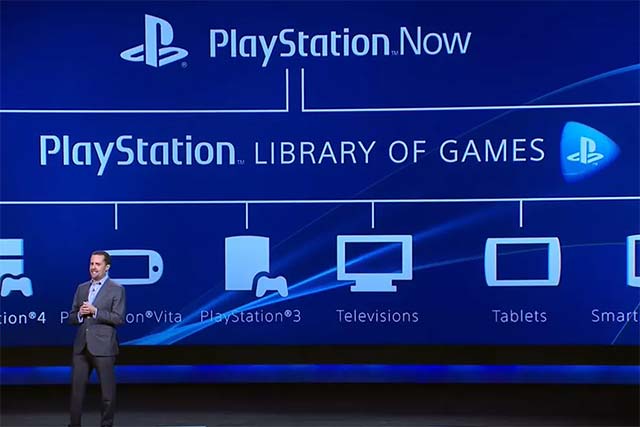
- From now on you can play PlayStation 4 games on your iPhone
Sony and Microsoft approaches are derived from the same cloud as Google Stadia, but it is important that they do not require developers to transfer their games or worse 'rebuild them'. for their live streaming service on the cloud. Both companies are using console hardware in the server system. It is a great benefit at the moment because both Sony and Microsoft can provide big game libraries without requiring developers to change anything. Meanwhile, Google's ambitious effort will require more "hardship" from developers, however, Google is in the hands of a long-term advantage that can be easily transformed. Its hardware in the future and make major changes without affecting the old hardware compatibility.
Saying so does not mean that Google's battle will be 'easier' in the future. Amazon seems to be a big competitor on Google's cloud platform in the near future, and as far as we know, Nvidia is also embracing a huge online gaming platform. Even Valve is expanding its Steam Link online streaming feature to allow users to stream their Steam games from PC to anywhere via Steam Link hardware or Steam Link applications.
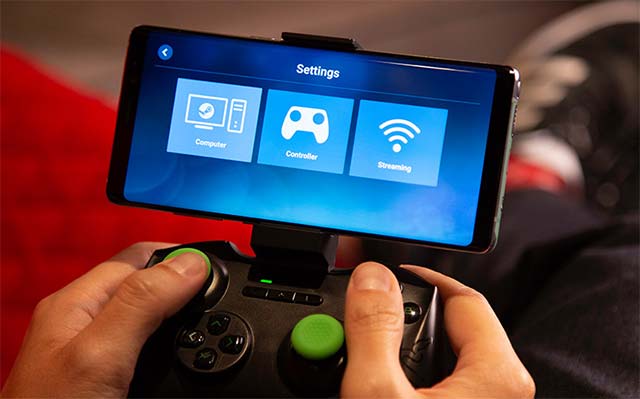
- Valve is about to launch a new app that lets you play Steam games easily on Mobile
Thus, it can be seen that, in terms of overall, Sony, Microsoft, Amazon and Google will be the 4 main forces that shape the 'battle field' with cloud-based game titles. Sony is in possession of the 'forces' of massive games and PlayStation Now platform, Microsoft can take advantage of Azure data centers and Xbox Game Pass for its ambitious xCloud trump, and Amazon can based on the dominance of the cloud platform, Prime and his famous Twitch service to entice gamers. So can Google make a miracle in this fierce and unpredictable battle? Let's wait and see!
You should read it
- ★ Stadia - Google's Chrome browser platform launched in November in 14 countries, supporting 31 games
- ★ Stadia - Google's new gaming platform can 'stifle' the mobile game market?
- ★ Google Stadia officially launched with the participation of 22 hit games
- ★ Google Stadia Pro is free for 2 months
- ★ Google Stadia captures rollout, newest games and everything else you need to know